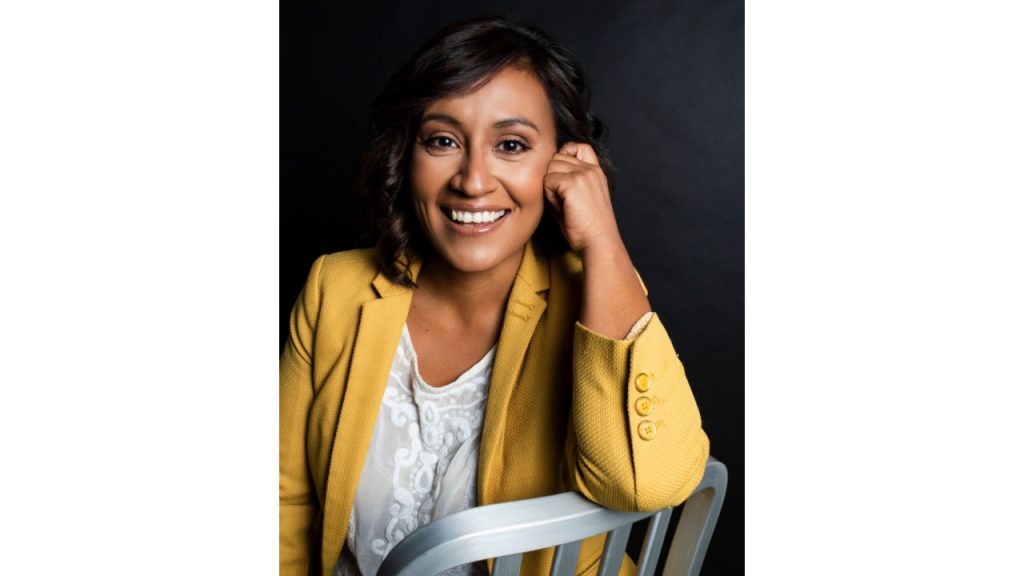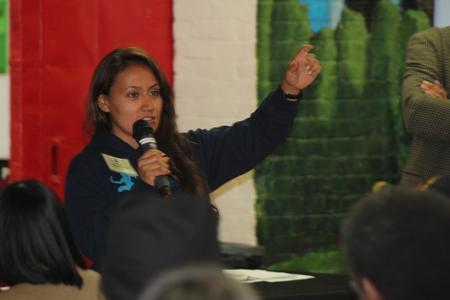Raquel Castaneda-Lopez on Leaving Detroit City Council, Creating Opportunity for Others and Addressing Harassment
The first Latina elected to the Detroit City Council will not seek a third term in office. Castañeda-López advocated for inclusion across the city. She also alleges she faced discrimination from some council colleagues.


Raquel Castañeda-López took office in 2014, part of a wave of new council members who swept into City Hall when Detroit’s governing charter changed to require that the council represent individual districts, rather than the century-old process of being elected “at large” from voters across the entire city. She faced personal attacks during what she called a “brutal,” but ultimately successful, second campaign.
Castañeda-López was in her early 30s when she took office. And she says she was ready to fight for a Southwest Detroit District 6 that’s home to everything from trendy Mexican restaurants to communities covered in soot from nearby heavy industry.
Castañeda-López pushed for inclusion. She pressed to make city services more accessible to people who spoke Arabic or Spanish. She led efforts to create a municipal identification card for those reluctant or unable to get an official state ID.
She also questioned zoning mandates that allowed residents to live near pollution-belching factories and argued for increased regulation of materials that could hurt both residents and the city’s riverfront. And she warned companies building in Detroit that the council was watching to ensure executives made good on promises to give city residents priority when new jobs were created.
“Residents know that they were valued, that they were heard and that they were seen, even if we weren’t able to accomplish everything that we set out to.” –Detroit City Council Member Raquel Castañeda-López
Some issues brought Castañeda-López into conflict with her council colleagues. She was a lone voice voting to reallocate $40 million of Detroit’s latest police budget to instead support social services.
Castañeda-López says she never sought confrontation. But she didn’t back away from it either. After all, she says, she never planned to be a professional politician.
“It’s not about serving until I die and being in that place because I can be in that place,” Castañeda-López says. “I don’t think that’s how our democracy was intended to work. I think to really have an inclusive, reflective democracy, when doors are opened for you, you should train and invest in other people and create that same opportunity for other folks.”
But Castañeda-López says she has no plans to leave Detroit.
“I really want to go back to my roots as a community organizer and a social worker and do more coalition building and co-governance with residents, using the experience and knowledge that I’ve gained as a council member over the past eight years.”
Castañeda-López says some of that knowledge came the hard way. She alleged that she’d been the victim of discrimination and a hostile work environment created by some of her council colleagues. A city department ruled there wasn’t enough evidence to take any action regarding her complaints. Castañeda-López is calling for the council to undergo workplace harassment training.
Listen: Detroit City Council Member Raquel Castañeda-López discusses what an inclusive democracy looks like.
Detroit City Council Member Raquel Castañeda-López: Serving these past seven-plus years has been the greatest honor of my life. And I never ever imagined that someone like me, who grew up in poverty in the city of Detroit, the daughter of an immigrant, I never thought that someone like me could even make it to council. And I truly believe that our democracy works best when we have diverse voices at the table, new ideas, new perspectives. And there’s always more work to do and always more to accomplish. But I felt confident in recruiting and supporting Gabriela Santiago-Romero to run for City Council District 6. And I really want to be able to go back to my roots as a community organizer and a social worker and do more coalition building and co-governance with residents, using the experience and knowledge that I’ve gained as a council member over the past eight years, to put that to work. And so, it was a very difficult decision, lots of back and forth. As the first Latina it was a tremendous honor to be chosen by residents of District 6 to serve in this spot. But it’s not about just, you know, serving until I die and being in that place because I can be in that place. I don’t think that’s how our democracy was intended to work. I think to really have an inclusive, reflective democracy, when you have doors open for you and opportunities created for you, you should constantly be looking to train and invest in other people and create that same opportunity for other folks. I’ll be 40 at the end of this year, which is crazy. And so, I’m excited to use the knowledge and move into something else.
Quinn Klinefelter, WDET: You have always sounded like a very progressive politician. And at times council has not sounded quite as progressive. They’ve taken a kind of a conservative approach in some budgetary matters, along with others. Do you worry now that you may be one of the few, if only, “progressive” quote-unquote voices that will suddenly be subtracted from council?
I think for me, again, democracy is not about one person. It’s not about one individual politician. It’s about the collective “we.” We as a community, we in the movement for social justice and racial equity. I think anyone who thinks it’s just about themselves and gets caught up in the ego and the bravado of politics and such, really should step down. It’s important to keep that humility at the forefront and recognize that you are part of a larger movement. And there are times where you play a role in that position. And there’s times where you step out of that and play a role in a different aspect. And so, for me, I’m not afraid that the progressive movement will stop. I’m more hopeful, actually, because in stepping off of council, I’ll be able to focus more of my efforts at electing more people who are rooted in the values of racial equity and social justice, more people that will lead with integrity and the courage that we need leaders to have to challenge the status quo. So I’m excited about the time I’ll have to be able to invest in and support, not just the person running for my seat, but running for seats citywide. Why? Because that’s really what we need. I mean, I was so inspired — and it’s also led into my decision — by the advocates and organizers in Georgia and in Arizona, who I have the privilege of knowing some of them. And that’s really my vision and what I’d like to see happen in Detroit, in Metro Detroit and the state of Michigan as a whole.
You’re gonna become the Stacey Abrams of Detroit, Michigan, now?
Ha! I don’t know if I can ever become Stacey Abrams. She’s amazing. And I’m honored even to have a comparison to her. But it’s what I’ve always felt that’s true to who I am as a person. And my core is about bringing people together. It’s often said that 50% of leadership is bringing people together in the same space. And that’s what I’ve loved about this role. And that’s the work that I want to be able to focus on. I’m excited about what my next step is for me, but also for the city of Detroit, because I think the nation is watching us. And I think Detroiters have been calling for years for these types of changes. And I think we’re on the precipice of a larger narrative shift.
Related: See who’s running for office in Detroit’s municipal election.
At the same time, though, you had earlier this year tried to get better workplace training for some council members and said that there had been some hostility or intimidation since you had taken office. How has that played into your decision (not to run again?) Or has it?
It hasn’t been a factor. I think when you’re the first in your field there’s always pushback and backlash and, you know, naivete and ignorance that manifests itself in micro-aggressions and implicit bias and discrimination. Whether you’re in a space of majority people of color or you’re in a space and you’re a minority amongst, you know, a white community. I’ve always, in some regard, whether it was in college or as a waitress or as a Head Start teacher and all of my roles, I’ve always been the one asking a million questions, kind of pushing the conversation forward. And so, I’ve learned so much from the challenges that I’ve had with colleagues in different settings. And they’ve all helped me grow. I value the tough moments and the beautiful moments that I’ve had on council. And I still have, like, eight months left, I’m not going anywhere. And we will be introducing several changes to the rules for council rules, to actually mandate training on an annual basis as it relates to sexual harassment and implicit bias and understanding the needs of the disability community, of the immigrant community, of the LGBTQ community. And understanding the needs of historically oppressed peoples. Because I think that will make all of us on council, both present day and future, better public servants.
This is one that you often hear when somebody has passed away. A hopefully that’s not the case for a long time for yourself…
Thank you!
But when people look back, when you look back, how would you like to be remembered as a member of the Detroit City Council?
I think, for me, the most important piece is that residents know that they were valued, that they were heard, that they were seen, even if we weren’t able to accomplish everything that we set out to accomplish. But I think we all as human beings want to be seen, valued and heard. And so, I hope that if anything is remembered about my time on council it’s that I worked hard to ensure Detroiters were seen, that they were heard and that they were valued.
Trusted, accurate, up-to-date
WDET is here to keep you informed on essential information, news and resources related to COVID-19.
This is a stressful, insecure time for many. So it’s more important than ever for you, our listeners and readers, who are able to donate to keep supporting WDET’s mission. Please make a gift today.
